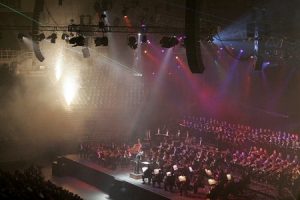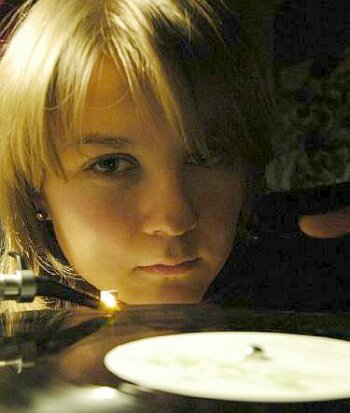Overture
 Overture in music is an instrumental (usually orchestral) piece, performed before the beginning of any performance – a theatrical performance, an opera, a ballet, a movie, etc., or a one-part orchestral work, often belonging to program music.
Overture in music is an instrumental (usually orchestral) piece, performed before the beginning of any performance – a theatrical performance, an opera, a ballet, a movie, etc., or a one-part orchestral work, often belonging to program music.
Overture prepares the listener for the upcoming action.
The tradition to announce the beginning of the presentation with a brief musical signal existed long before the term “overture” entrenched itself in the work of French and then other 17th century European composers. Until the middle of the XVIII century. the overtures were composed according to strictly defined rules: their sublime, generalized nature of the music usually had no connection with the subsequent action. Gradually, however, the requirements for the overture changed: she was more and more subordinated to the general artistic plan of the work.
Having retained the function of the “invitation to the spectacle” for the overture, the composers, beginning with C. V. Gluck and W. A. Mozart, significantly expanded its content. By means of music alone, even before the theater curtain rises, it was possible to tune the viewer in a certain way, to tell about upcoming events. It is not by chance that the sonata became the traditional form of the overture: succinct and effective, it allowed to present the various acting forces in their confrontation. Such, for example, is the overture to the opera by K. M, Weber’s “The Free Shooter” – one of the first to include an “introductory review of the content” of the entire work. All diverse themes – pastoral and darkly sinister, restless and full of triumph – are associated either with the characteristics of one of the actors, or with a certain stage situation and subsequently repeatedly appear throughout the opera. The overture to “Ruslan and Lyudmila” by M. I. Glinka was also resolved: in a whirling, rushing movement, as if, in the words of the composer himself, “with full sail”, the dazzlingly cheerful main theme (in the opera it will become the theme of the choir, glorifying the liberation of Lyudmila), and the melody melody of love of Ruslan and Lyudmila (she will sound in the heroic aria of Ruslan), and the whimsical theme of the evil wizard Chernomor.
The fuller and more perfect the plot-philosophical conflict of the composition is embodied in the overture, the faster it acquires the right to separate existence on a concert stage. Therefore, already in L. Beethoven, the overture is composed as an independent genre of symphonic program music. Beethoven’s overtures, in particular the overture to the drama by I. V. Goethe “Egmont”, are complete, extremely saturated with the development of musical dramas, with intensity and activity of thought that are not inferior to his large symphonic canvases. In the XIX century. the genre of the concert overture is firmly included in the practice of Western European (overture “A Midsummer Night’s Dream” by F. Mendelssohn based on the comedy by William Shakespeare) and Russian composers (“Spanish Overtures” by Glinka, “Overture on the Themes of Three Russian Songs” by M. A. Balakirev, Overture-fantasy “Romeo and Juliet” by P. I. Tchaikovsky). At the same time, in the opera of the second half of the XIX century. The overture is increasingly transformed into a short orchestral introduction, which is directly put into action.
The meaning of this introduction (also called introduction or prelude) may consist in proclaiming the most essential idea – a symbol (the motive of the inevitability of the tragedy in J. Rédiotto Rigoletto) or in the characterization of the main character and at the same time creating a special atmosphere that largely determines the figurative structure of the work ( introduction to “Eugene Onegin” by Tchaikovsky, “Lohengrin” by R. Wagner). Sometimes the introduction is both symbolic and pictorial-pictorial. Such is the opening opera of M. P. Mussorgsky’s “Khovanshchina” symphonic film “Dawn on the Moscow River”.
In the XX century. composers successfully use various types of introductions, including the traditional overture (overture to the opera “Cola Brunion” by D. B. Kabalevsky). In the genre of concert overtures on folk themes, the Russian Overture was written by S. S. Prokofiev, Overture on Russian and Kyrgyz folk themes by D. D. Shostakovich, Overture by O. V. Takt a-Kishvili; for the orchestra of Russian folk instruments – “Russian Overture” by N. P. Bu-Dashkina, etc.
Tchaikovsky Overture
The overture of 1812 is an orchestral piece by Pyotr Ilyich Tchaikovsky in memory of the Patriotic War of 1812.
The overture begins with the gloomy sounds of the Russian church choir, recalling the declaration of war, which was carried out in Russia at church services. Then, immediately, the festive singing of the victory of Russian weapons in the war sounds. The declaration of war and the reaction of the people to it was described in Leo Tolstoy’s novel War and Peace.
Then follows a tune representing the marching armies, performed with the help of pipes. The French national anthem “Marseillaise” reflects the victories of France and the capture of Moscow in September 1812. The sounds of Russian folk dance symbolize the battle of Borodino. Escape from Moscow at the end of October 1812.


